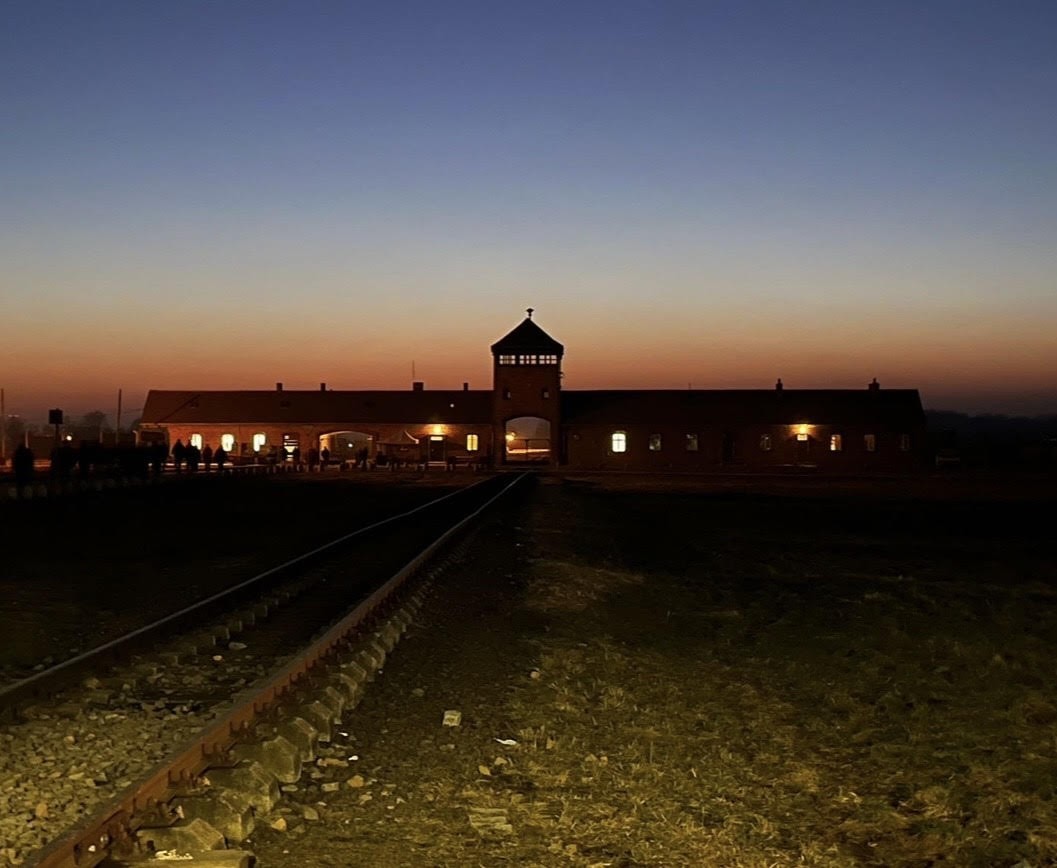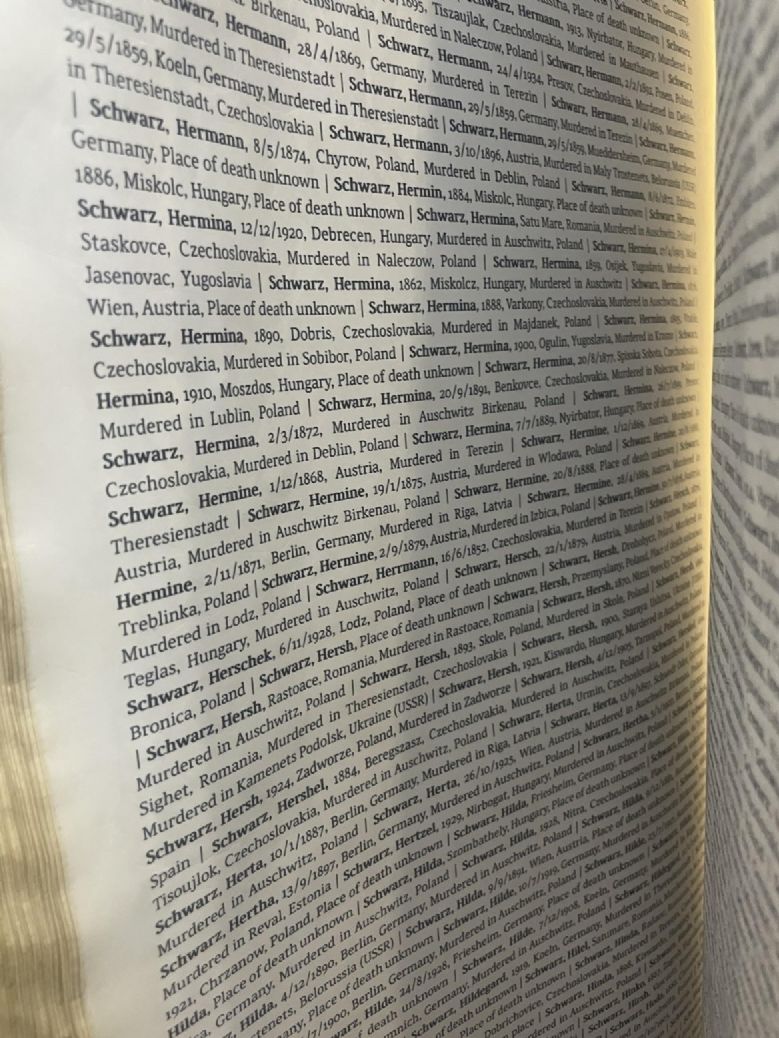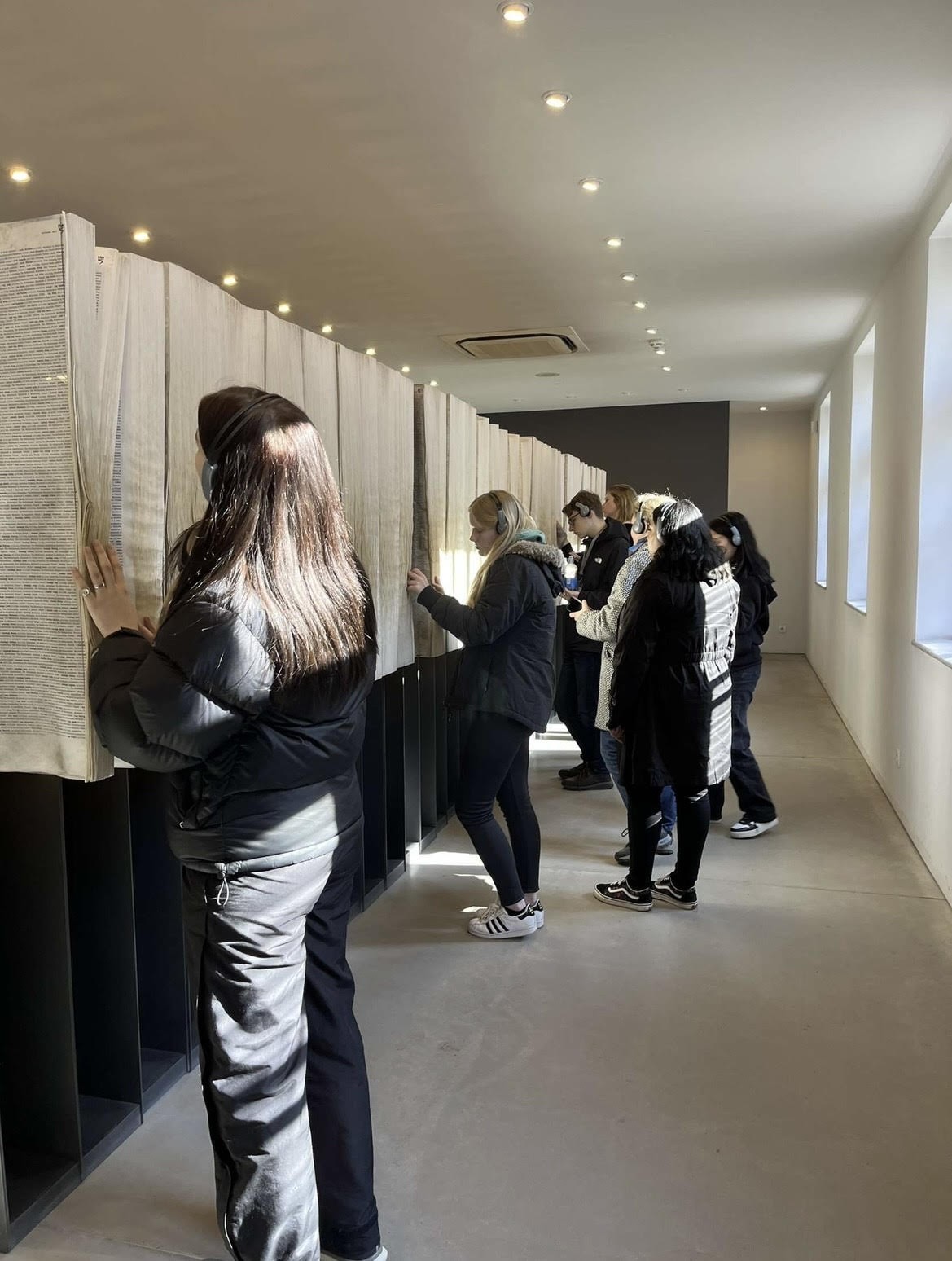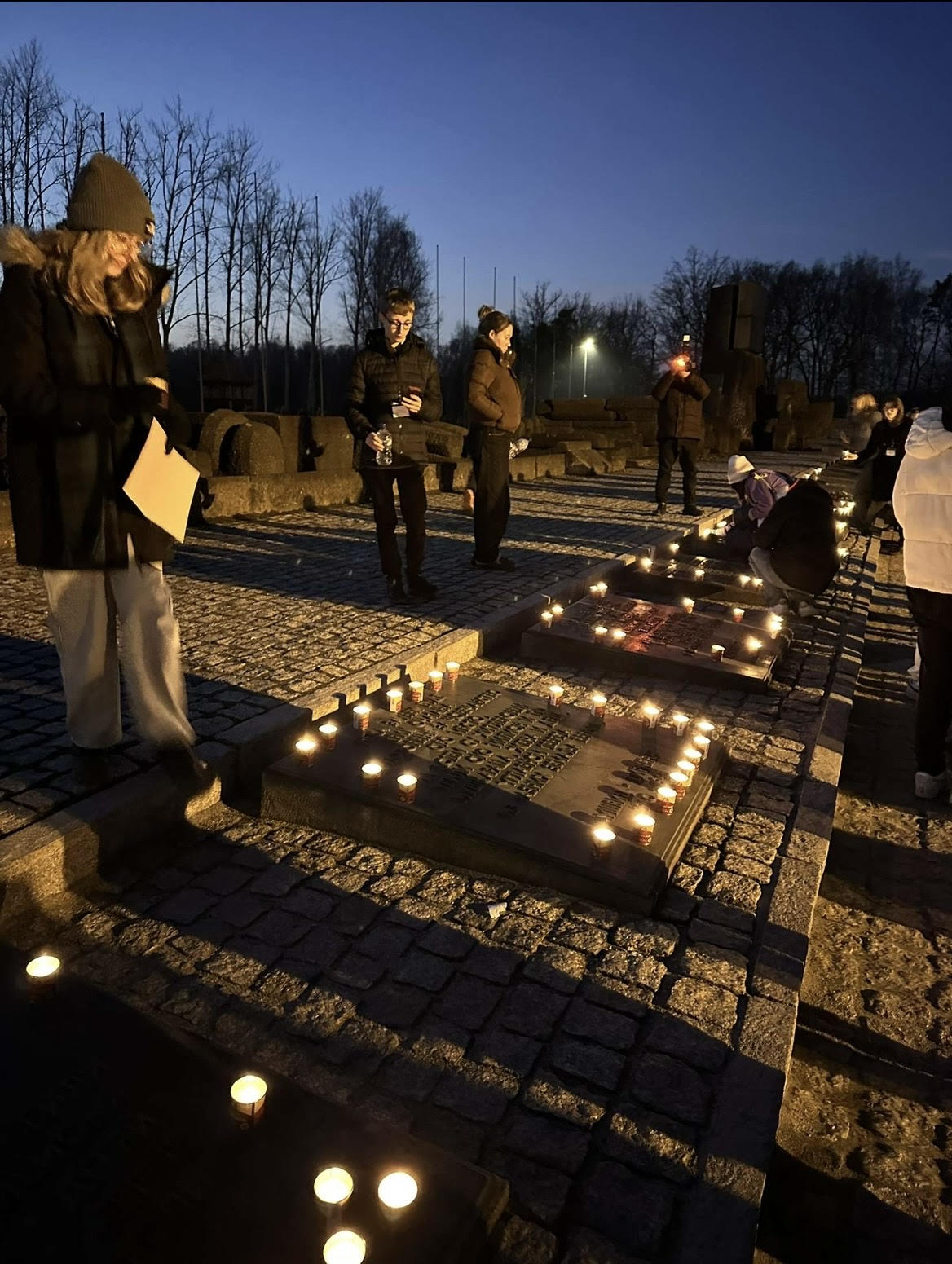Our Auschwitz Experience

Leah, Abigail, Ellie, and Trinity as part of the Lessons From Auschwitz project have written an article about their experiences at Auschwitz.
Our Auschwitz Experience
The holocaust was the murder of approximately 6 million Jews, men, women and children, by nazi Germany and its collaborators during the Second World War. Auschwitz is the largest and most well known concentration camp from the holocaust. As a result, visiting Auschwitz is an effective way to learn the truth about the holocaust.
 Trinity, Abigail, Ellie, and I have taken part in a project run by a company called Lessons From Auschwitz. During this course we learnt about pre-war jewish life and how extremely normal Jews were. They did not pose any sort of threat. They had jobs, houses and families just like everyone else, there was no rational reason for the Nazis to target them. Following this, we all flew to Poland to visit the sub camps of Auschwitz Monowitz and Auschwitz-Birkenau. It was incredibly surreal to be there, and suddenly made the Holocaust feel a lot more real than before. After the visit to the camps we got to hear the testimony of a Holocaust survivor.
Trinity, Abigail, Ellie, and I have taken part in a project run by a company called Lessons From Auschwitz. During this course we learnt about pre-war jewish life and how extremely normal Jews were. They did not pose any sort of threat. They had jobs, houses and families just like everyone else, there was no rational reason for the Nazis to target them. Following this, we all flew to Poland to visit the sub camps of Auschwitz Monowitz and Auschwitz-Birkenau. It was incredibly surreal to be there, and suddenly made the Holocaust feel a lot more real than before. After the visit to the camps we got to hear the testimony of a Holocaust survivor.
Janine Webber was a jew born in Lvov in 1932, she is now just over 90. In 1939 the war started with Janine only age 7. The Gestapo came for her father, but he jumped from their second floor balcony to the first floor balcony and so was not found. He returned later with a broken leg and the family were forced to move. They got a room in a house and whilst there the Gestapo came for her family twice. The first time they found her grandmother and dad. They were taken, shot, and killed. They moved into a Ghetto where her mother died from Typhus when Janine was 9. Janine and her aunt lived in a farmers stable. Her and her brother lived with a family but were betrayed and her brother was shot in front of her. Janine went back to Lvov and was hidden by Edek in a bunker with 14 other Jews. Janine went to live in a convent, then with a priest. At 11 and a half she became a maid for an elderly couple. She was found by her aunt after the war and illegally moved to England.
She met an Englishman and got married. Janine now has two sons and two grandsons and teaches her family to be kind to minorities, be tolerant, and stand up to bullying and persecution. During this whole ordeal she lost her faith. She is still Jewish, however she doesn’t practise. Janine will never stop being holocaust survivor. The trauma, memory, and loss will always be with her. At first Janine struggled to tell anyone about what had happened to her, but after over 3 years with a psychotherapist she was mentally ready to talk and has been sharing her experience to raise awareness ever since.
Janine has overcome so much to be where she is now. She was running, hiding and moving her whole childhood, losing her family, and constantly scared of being found. This caused a lot of psychological damage. Janine has fought to overcome this to share her story with the younger generations so that her and her family are not forgotten. Our job now is to continue to share the stories of Janine and other survivors so that they are not forgotten and their experiences are not overlooked.
By Leah Yeldham
Throughout our time in Poland, our guides continuously emphasised the importance of recognizing the holocaust victims as not just a figure or statistic – as this cannot fully capture the extend of the genocide and aids in the reader being able to emotionally distance themselves from this horrific event – but, rather, to remember that behind these numbers are real people. Individuals who had their lives ripped apart because of their religion and beliefs.
As stated above, we heard from a Holocaust survivor, Janine Webber, but the exhibits and displays within the Auschwitz camps were another way that we were reminded of the individuality of the victims. For example, we had the opportunity to look at several displays of personal items the victims brought with them – it was a harrowing and tragic sight. Many brought photographs of loved ones and items like razors, pots and pans and other tools necessary to start a new life. This had a huge impact on everyone in our group; to see the false hope that these people had is devastating, they believed that they were moving away from the war to start over, but in reality, they were being led to their deaths.
displays within the Auschwitz camps were another way that we were reminded of the individuality of the victims. For example, we had the opportunity to look at several displays of personal items the victims brought with them – it was a harrowing and tragic sight. Many brought photographs of loved ones and items like razors, pots and pans and other tools necessary to start a new life. This had a huge impact on everyone in our group; to see the false hope that these people had is devastating, they believed that they were moving away from the war to start over, but in reality, they were being led to their deaths.
However, it was also stressed to us about the importance of understanding that those involved in the running of the camps were also human beings too who are not inherently evil – the holocaust is so complex that even those considered to be on the ‘wrong side of history’ cannot be dismissed as being pure evil. In labelling them these things, their responsibility is diminished, it insinuates that they had no choice in the role that they played, but they did. For example, while on the tour of Auschwitz-Birkenau we were told a story where a young woman was released from captivity by a Nazi soldier, who was in charge of loading the trains headed to the camp, because he had known her family before the war. This is something that many of our group struggled to understand and grasp the concept of, but the guide's explanations helped us to understand why we should not place everyone in one category.
By Abigail Denham
 In our orientation seminar we learnt more about what the holocaust really was, beyond the statistics we would usually see and the origins of antisemitism. Centuries before the war, antisemitism was still very prevalent within society and Jews survived in Europe as a persecuted and despised minority. Antisemitism rose in the middle ages, there was a belief that Jews were responsible for the death of Jesus, as well as this they were also accused of using the blood of christian children for religious ritual purposes. These accusations often resulted in Pogroms, a violent attack on Jewish communities. An example of this is Hugh of Lincoln from the 13th century, a Jewish man was arrested and tortured until he confessed to a crime he did not commit and blamed the Jewish community in exchange for protection against execution - however the king had him executed anyway and arrested 91 other Jews. It’s important we recognise that antisemitism didn’t just begin with the holocaust but began many centuries ago and is still prevalent in society today. Throughout history Jews have also been pushed into professions that originated the stereotypical portrayals of them. Professions such as tax collecting or money lending led to the idea that Jews were obsessed with money. These historical origins of antisemitism changed from revolving less around religion and into more around race, what we would call modern antisemitism.
In our orientation seminar we learnt more about what the holocaust really was, beyond the statistics we would usually see and the origins of antisemitism. Centuries before the war, antisemitism was still very prevalent within society and Jews survived in Europe as a persecuted and despised minority. Antisemitism rose in the middle ages, there was a belief that Jews were responsible for the death of Jesus, as well as this they were also accused of using the blood of christian children for religious ritual purposes. These accusations often resulted in Pogroms, a violent attack on Jewish communities. An example of this is Hugh of Lincoln from the 13th century, a Jewish man was arrested and tortured until he confessed to a crime he did not commit and blamed the Jewish community in exchange for protection against execution - however the king had him executed anyway and arrested 91 other Jews. It’s important we recognise that antisemitism didn’t just begin with the holocaust but began many centuries ago and is still prevalent in society today. Throughout history Jews have also been pushed into professions that originated the stereotypical portrayals of them. Professions such as tax collecting or money lending led to the idea that Jews were obsessed with money. These historical origins of antisemitism changed from revolving less around religion and into more around race, what we would call modern antisemitism.
Additionally, within our orientation seminar, we learnt that every individual who was unjustly discriminated against because of their religion was part of a community, not just a statistic from a history book. When we speak of their loss, it isn’t just a loss of life but a loss of culture, customs, and ideas. This is why it’s important to speak up about antisemitism and any form of discrimination. To ensure history doesn’t repeat itself, and to ensure everyone has the chance they deserve to safely practise their religion and explore their culture without the fear of being persecuted.
By Ellie Day
For me I feel the trip to Auschwitz didn't only provide me as well as my group with knowledge of the stories of those who were in Auschwitz and what happened there but also gave me more of an emotional understanding of Auschwitz. For me it opened my eyes to the true atrocities committed there, it provided a different understanding to what happened than what a history book can.
The trip to Auschwitz was only for a day yet provided so much valuable information that without the visit there just would not have been possible. I think one of the key takeaways from the visit to Auschwitz was that everyone there, although being in the same place, had a very different story and all came from very different circumstances, of which cannot all be heard. However, the story of Janine Webber which has been previously mentioned is one we were all lucky enough to have been able to hear. I feel as though it was experiences like that which truly demonstrated the effect the holocaust had on people. Another important takeaway I feel was being aware that not everyone who died during the holocaust and in Auschwitz is known so we must also remember those who we don’t know the names of.
On the day of the visit to Auschwitz we were taken around certain blocks with some housing the possessions of those who were in Auschwitz, these possessions ranged from pictures to spare clothing, to kitchen utensils, this being because those going to Auschwitz didn’t actually know what to expect. Then in other blocks, there were different types of possessions, such as the clothes worn by those in Auschwitz as well as the hair of those there. This for me really put it into perspective, the fact that I was looking at the possessions of those who had been there but under extremely different circumstances. For me another truly emotional yet eye opening moment was seeing photos of children who were in Auschwitz alongside their parents yet their parents wouldn’t necessarily have known they were there or what had happened to them.
The next stage of the visit was visiting Auschwitz Birkenau, in which we were able to see the places in which people would have slept in whilst there, to me it was so strange to see as even with a couple of groups in it started to feel crowded and that was just a small percentage of how many people would actually have been in there. After we had made our way around Auschwitz Birkenau we then were lucky enough to attend a memorial service led by a rabbi, this for me as I feel for many in my group was possible one of the most memorable experiences of the day, lighting candles and remembering all those who were there as well as all others who lost their lives during the holocaust.
places in which people would have slept in whilst there, to me it was so strange to see as even with a couple of groups in it started to feel crowded and that was just a small percentage of how many people would actually have been in there. After we had made our way around Auschwitz Birkenau we then were lucky enough to attend a memorial service led by a rabbi, this for me as I feel for many in my group was possible one of the most memorable experiences of the day, lighting candles and remembering all those who were there as well as all others who lost their lives during the holocaust.
For me and for many I think the trip to Auschwitz demonstrated how we can’t let what happened be forgotten and that it is something people need to be educated on.
By Trinity Lusher
